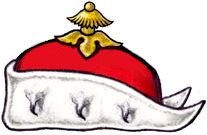Titles of nobility
(peerages) are conferred by the monarch. In most hereditary peerages, the title is passed
on to a peer's oldest son or in the absence of a son, to his closest male heir. The
title becomes extinct if there is no male heir, although some ancient peerages allow the
title to be passed to a daughter in that case.
Life peerages are
created each year by the monarch for distinguished persons.
Life peers hold the rank
only for their own lives, and as such, the titles do not pass on to their children. A man
or a woman may be granted a life peerage; the titles given to them are Baron or Baroness.
Feudal Barons are
holders of Lands that has by
charter been erected by the Crown in liberam baronium, giving the owner, whether by
inheritance or by acquisition, a whole bundle of land, mineral, and other rights,
including certain rights of public justice, privileges not belonging to ordinary estates
and unlike Life Peerage and hereditary Peerage it
does not become extinct. There are also Feudal Dukedoms, Marquisates ( i.e. Huntley ) and
Earldoms (i.e.
Aaran)
Duke, Duchess
Created 1337. Highest rank of peerage.
Marquis (also
Marques), Marchioness
Created 1385. Rank above Earl, below a Duke.
Earl (Count),
Countess
Created c.800. Chief royal representative in the shires, replacing the Anglo Saxon
equivalent, "ealdorman".
Viscount,
Viscountess
Created 1440. Rank in peerage below Earl, above Baron. Originally, a viscount was a
sheriff of a shire (county) and was the Earl's deputy.
Lords of Parliament (
Scotland only)
A group of Feudal Barons chosen to represent other barons in the Scottish Parliament
during the 16th century, who by custom were elevated to a higher
position than other Feudal Barons, this was a subject of a litigation
between a group of Baron vs. Lord Lyon in June 1673 ( See note below)
Feudal Baron,
Baroness
Created c.1066. Lowest rank of the peerage ( Scottish Feudal Barons are no longer Peers by
some accounts, however there is not a clear Act of Parliament to support
that view, only that
they were exempt from attending Parliament at their own request), usually applied to
tenants-in-chief, the holders of land granted to them directly by the monarch.
Life Baron, Baroness
(By Writ )
Lowest rank of the peerage, created by writ in the case of lords or barons of parliament,
normally by indication of the Government of the day, in some case also by indication of
the HM Loyal Opposition.
Baronet
Created 1611. A special hereditary rank, above Knight and below Baron, introduced by James
I for the purpose of raising money for the suppression of the rebellion in Ulster.
Baronets were required to pay £1,080 for the privilege of their rank. The last Baronet
created in the UK was Sir Dennis
Thatcher, title today in the Hands of Sir Mark Thatcher, the former PM's son.
Lord
Not a title, per se, but a form of address for a marquis, an earl, a viscount,
a baron, the holder of a
Lordship of the
manor, a younger son of
a duke or marquis, and or a bishop.
As one can see by this Court Case
of 1673 the argument concerning Peerage or none Peerage nature of Scottish Baronies have lingered for over
300 years. It probably will continue for a long time to come, the fact is that neither Feudal Baron
nor Lord of Parliament can sit in the House of the Lords as the law stands today, for a
time still 92 Peers can be elected, however the Labour Government has declared that by 2006
none will sit in Parliament.
Sundry
Barons v. Lord Lyon, June, 1673
(source: Brown's Supplement,
iii. 6).
1673.
June. Sundry BARONS, &c.
against The LORD LYON.
ABOUT the same time, in June, 1673, I
heard of a process some Barons and Gentlemen had intended against my Lord Lyon, to hear
and see it found and declared that he had done wrong in refusing to give them forth their
coats of arms with supporters, whereof they and their predecessors had been in possession
past all memory, and never quarrelled till now; and, therefore, that he might be decerned
to immatriculate them so in his register, and give them forth an extract; conform, as is
provided by the late act of Parliament in 1672. The Lyon's reason is, because, by an
express letter of his Majesty's, none under the dignity of a Lord must use supporters. (He
grants them now to some who were: in possession of them of old.). But the gentlemen answer, that Lords at the beginning, having
been only Barons, and in regard of the considerable interest they hid in their respective
shires, being commissionate from the small barons and freeholders to represent them in
Parliament, they, because of that credit, got first the denomination of Lords, without any
patent or creation; and, upon the matter, were nothing but Barons: and so what is due to
them is also due to the other, they originally not differing from the rest by any
essential or superior step of dignity. So Craig, pages 78 and 79.—REPLIED, Whatever
was their rise, the other Barons have clearly acknowledged a distinction now; in so far as
they have renounced their privilege of coming to Parliaments by the 113 act in 1587; and
the distinction being made, and their privileges renounced, by the small Barons in the
Parliament 1427. DUPLIED, that act is introduced in their favours, and nowise -debars them
; but allenarly dispenses with their absence, and the penalty they incurred thereby,
&c. The Gentlemen found on the Interdictum uti possidetis : the Lyon says, it
is but vetustas erroris, and an usurpation.
The complainers are the Lairds of
Dundas, Halton, Polmais, &,c.
Advocates' MS. No.
393, folio 216
Directory Page |
![]()
